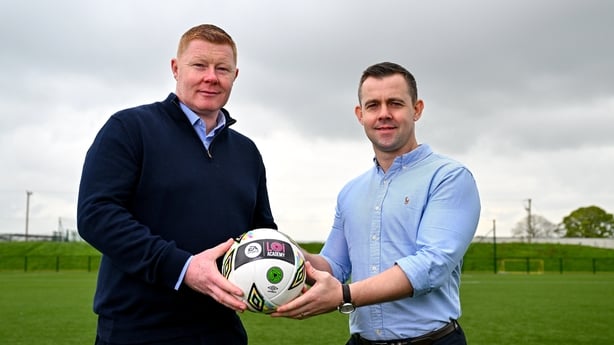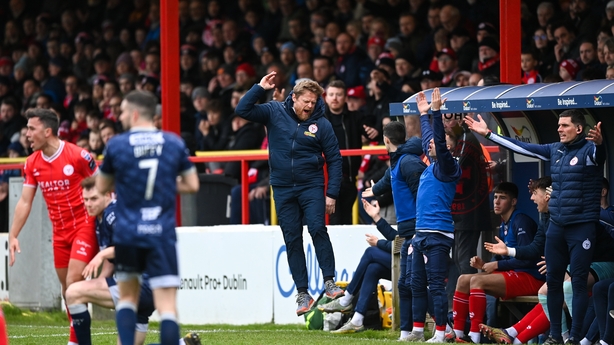Watching Euro 2024 over the past few weeks has been great for any football enthusiast. However, as fulfilling as it has been (who doesn't like watching three games a day?), there is that lingering sense of frustration.
Ireland's absence from the tournament is a sobering reminder of the challenges we face in developing our football infrastructure and talent pipeline. The key to changing this narrative lies in significant and sustained investment in Irish football.
The necessity for funding in Irish football has been widely discussed, especially since Brexit. The traditional pathway of Irish players moving to UK clubs for their development is no longer viable.
The system that produced talents like Damien Duff and Robbie Keane who went to the UK at 15/16 is outdated. We cannot rely on UK clubs to provide the necessary training and minutes for our young players anymore.
As a result, the development of homegrown talent within Ireland has become more critical than ever.
The stats are telling.
The League of Ireland’s recent presentation to Leinster House, led by Will Clarke and Shane Robinson, laid out the bleak realities.

The number of players competing in the top five European leagues and the average minutes played per season are critical indicators of a country’s success at senior international level.
For countries outside the top five European football nations, long-term success is closely linked to these factors.
Ireland needs between 36 and 42 players, each playing on average 1,350 minutes per season in one of the top five European leagues to be competitive.
In the 22/23 season, we had 16 players while our average was 613 minutes per season. We're light years away.
Another harsh stat from that Leinster House briefing - only four of the last 52 European countries that qualified for the men's FIFA World Cup had a FIFA ranking lower than 25, with the lowest being 36 (Denmark in 2018).
Ireland's current ranking is 60.
Now, how do we fix this?
We have 357 Irish-born full-time players worldwide: 193 of these players perform here in the League of Ireland and with our brightest talents now unable to go to the UK at 16, the solution lies in creating a sustainable academy structure in Ireland with an accessible pathway into first-team football in the League of Ireland.
Facilities, player education, full-time and part-time coaches, recruitment, talent ID, full-time players from the age of 16 and implementing the football pathways plan – these are the areas which require funding to create a robust footballing ecosystem that can nurture and retain talent.
The League of Ireland, which has seen record attendances surpassing the 500,000 mark at the halfway point of the season, is evidence of the growing interest and potential of domestic football.
This surge in attendance underscores the appetite for high-quality football and the importance of investing in the league and our academies to sustain and build on this momentum.
The League of Ireland section of the FAI has been vocal about the need for funding, rumours estimating that €10m per year could, over time, significantly and sustainably improve the pathways for young footballers.

The goal is to produce better players, enhance the national team's performance, and increase the frequency of our participation in major tournaments.
Investing in Irish football should not be viewed as a handout but as a strategic economic move.
According to the FIFA transfer report, countries like Denmark and Croatia, with similar populations to Ireland, have seen substantial returns on their investments in football academies, with gross incomes of over $185m and $168m respectively over three years.
In contrast, Ireland’s figures aren’t even comparable during the same period, with much of it inflated by inserted sell-on clauses from player transfers and hampered by release clauses in players contracts.
By investing €500,000 to €1m into elite football academies, we could see substantial long-term benefits not only for football but for the economy as well.
While it is unlikely that a single government grant will cover all these needs, a creative approach to accessing existing funds could be the solution.
Clubs, alongside the FAI, need to think outside the box to secure funding. This includes exploring sponsorships, partnerships, grants and leveraging community support.
This investment would create a football industry in Ireland, creating full-time employment and future-proofing our football clubs.
The secondary benefits, such as community engagement, youth development and economic returns are equally significant.
Building a robust football infrastructure will ensure that future generations have the opportunity to develop their talents domestically.
In the coming weeks, this column will explore potential funding sources and innovative approaches to securing the financial support needed to elevate Irish football.
The journey towards regular tournament qualification is challenging but not impossible.
With the right investment and strategic planning, the dream of seeing Ireland in major international tournaments can become a reality.
Watch every game from Euro 2024 on RTÉ2 and RTÉ Player as well as highlights and goals as they happen on RTÉ Sport digital platforms.


